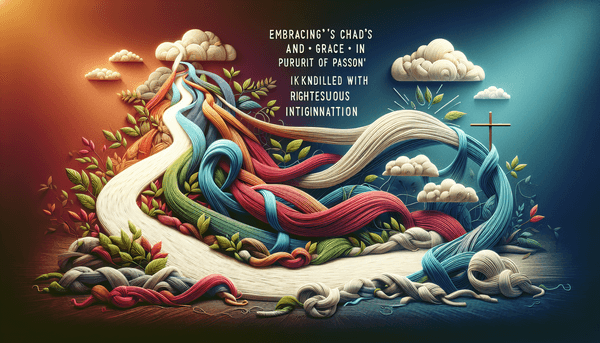Respect for Other Religions
In a world brimming with diverse beliefs, Christianity teaches the importance of respecting others, including those of different faiths. Jesus Himself commanded us to 'love your neighbor as yourself' (Matthew 22:39), a principle that extends beyond cultural and religious boundaries. Ephesians 4:29 encourages believers to speak only what is helpful for building others up, a guideline that inherently promotes interreligious respect and dialogue. As followers of Christ, we are called to be peacemakers (Romans 12:18), engaging with others in a spirit of gentleness and respect (1 Peter 3:15). By doing so, we not only honor the dignity of every individual but also reflect the love and grace that are central to the Christian message. To deepen our understanding of such spiritual practices, including prayer, we can explore biblical guidance on prayer, a profound dialogue with the divine that further opens our hearts to love and respect for all.
Overcoming Gossip in the Christian Life
The Bible cautions against the destructive power of the tongue, a theme echoed in James 1:26, which warns that unchecked speech can undermine one's religious endeavors. Gossip, in particular, is condemned as contrary to the love and integrity that should characterize Christian conduct. Ephesians 4:29 teaches us to use our words for constructive purposes, to build others up rather than tearing them down. To overcome the temptation of gossip, believers can seek God's help in prayer, practice mindfulness of their words, and surround themselves with a community that values wholesome talk. As Proverbs 16:28 warns, a perverse tongue can be a dangerous catalyst for conflict, a reminder of the need for vigilance in our speech.
The Differences Between Christianity and Islam
Christianity and Islam are two of the world’s major religions, each with its own unique theology and practice. Central to their divergence is the figure of Jesus. For Christians, Jesus is the Son of God, the savior whose death and resurrection offer eternal life to believers (John 3:16). Islam reveres Jesus as a prophet but not divine. The path to salvation is also distinct; Christianity emphasizes faith in Jesus' sacrifice (Acts 4:12), while Islam stresses submission to God's will and good deeds. The Bible and the Quran are each religion’s respective holy texts, serving as the foundation of faith and practice for their followers. This fundamental theological divergence shapes the identity and worldview of each faith tradition.
Conclusion
As we conclude our exploration of these biblical themes, it's clear that the ancient texts of the Bible continue to offer profound insights into our contemporary lives. From end-time prophecies to the enduring example of Jesus, the principles of interfaith respect, and the power of our words, these subjects challenge us to reflect on our beliefs and actions. They inspire us to live with purpose, integrity, and compassion, bridging the gap between the sacred and the secular. Whether we are navigating the complexities of interfaith relationships or striving to emulate the perfect example of Christ, the Bible provides guidance and encouragement for our journey. Let us carry these lessons forward, allowing them to shape our understanding and transform our lives.
FAQ
Q: What is the difference between Christianity and Judaism?
A: The difference between Christianity and Judaism lies in their beliefs about the Messiah. Christians believe that Jesus Christ is the promised Messiah foretold in the Old Testament, while Judaism awaits a future Messiah. There are also differences in the concept of God, with Christians believing in the Trinity and Judaism upholding a strict monotheism. Practices, traditions, and interpretations of scriptures also vary between the two faiths.
Q: Is it okay to doubt the existence of Jesus?
A: Doubts and questions are a natural part of the human experience. The Bible encourages seeking truth and understanding, so if you have doubts about the existence of Jesus, it's important to seek answers through study, prayer, and dialogue with knowledgeable individuals.
Q: What is the difference between Christianity and Islam?
A: Christianity and Islam differ primarily in their views of Jesus and the path to salvation. Christians believe Jesus is the divine Son of God and savior, while Muslims regard him as a prophet. Salvation in Christianity is through faith in Jesus' sacrifice, whereas in Islam, it involves following God's will and performing good deeds. The religions also have different holy texts, the Bible for Christians and the Quran for Muslims.
Q: Why should you not bring down other religions?
A: The Bible teaches love and respect for others, regardless of their beliefs. Jesus' command to 'love your neighbor' implies respecting the dignity and beliefs of all people. Engaging with other religions respectfully can promote understanding and peace.






